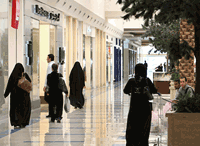
Saudi economic growth to hit 4.7pc
Jeddah, April 11, 2012
Saudi Arabia's economy is likely to grow to 4.7 per cent from the 2.9 per cent forecast earlier mainly driven by the high oil prices and elevated oil output, according to a report.
Given challenging regional dynamics that have pushed oil prices significantly higher this year, and commitments by Saudi Arabia to boost oil output to help ease prices, the 2012 oil output will average 9.8 million barrels per day (mbd), said Standard Chartered in its latest forecast.
The bank said Saudi Arabia had entered 2012 with positive fundamentals supporting growth thaks to the skyrocketing oil prices backed by substantial government spending and ample banking-sector liquidity.
Government spending on nonoil infrastructure projects is likely to be 7 per cent higher than last year. The oil sector is likely to be slightly higher versus 2011, with most of the growth coming from the nonoil economy, according to a report by Standard Chartered.
The bank said its initial forecast was driven by expectations that annual oil output would be cut to 8.42mbd in 2012 from 9.29 mbd the previous year.
The bank pointed out that the Saudi government's policy was focused on infrastructure and social programs.
The 2012 budget allocates $45 billion to the education sector, including 742 new schools and 40 new colleges. Health care is allocated $23.1 billion and includes 17 new hospitals, in addition to the 130 under construction, it stated.
Infrastructure spending includes $9.4 billion for transport; projects include the expansion of a number of the country’s airports, and the construction of close to 4,000km of roads, the report added.
In terms of projects awarded, Saudi is the region’s busiest market across all key sectors, from infrastructure to power and gas, said the Standard Chartered in its report.
In 2011, new projects awarded in Saudi Arabia totaled $69 billion accounting for 55 per cent of the total $124 billion of projects awarded in the GCC countries.
The Kingdom’s share of a total potential pipeline of $172 billion projects in the Gulf was around $61 billion this year. It has already awarded $8.4 billion of projects since the beginning of the year, it added.
According to Standard Chartered, Saudi was now taking a leadership role in addressing high oil prices. Minister of Petroleum and Mineral Resources Ali Al-Naimi has already stated that oil prices are too high and the Kingdom stands ready to boost output by close to 25 percent if necessary, to bring prices under control.
Regional tensions have pushed oil prices significantly higher this year, with concerns that markets are likely to face supply shortages.
According to the report, Saudi’s inflation hit a 14-month high of 5.4 per cent in February mainly driven by higher food and housing costs, which climbed 0.5 per cent and 0.7 per cent m/m, respectively.
Unlike the UAE and Qatar, Saudi has an undersupplied housing market, where the demand dynamics of a growing population, high government spending and urbanization are pushing rental yields higher (up by 11 per cent in some areas), it stated.
On the liquidity position, Standard Chartered said the Kingdom's credit growth was at 11.6 per cent y/y in January, driven both by the healthy position of banks and economic activity.
Given plans to push ahead with infrastructure development, and the healthy position of Saudi banks, the GDP and credit growth will remain robust, with the latter averaging 9.5 per cent in 2012, the report added.-TradeArabia News Service







